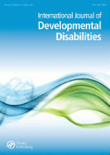
International Journal of Developmental Disabilities
Scope & Guideline
Advancing knowledge in developmental disabilities.
Introduction
Aims and Scopes
- Research on Autism Spectrum Disorder (ASD):
The journal publishes a substantial amount of research related to ASD, including studies on interventions, coping strategies, and educational practices, reflecting a commitment to improving outcomes for individuals on the spectrum. - Interventions and Therapeutic Approaches:
A core focus is on innovative therapeutic interventions, including behavioral therapies, physical activity programs, and alternative therapies, aimed at enhancing social skills, communication, and overall well-being. - Family and Caregiver Perspectives:
The experiences and challenges faced by families and caregivers of individuals with developmental disabilities are extensively explored, highlighting the importance of support systems and the impact of caregiving on mental health. - Cultural and Contextual Factors:
The journal emphasizes the influence of cultural, socioeconomic, and contextual factors on the experiences of individuals with developmental disabilities, showcasing studies from diverse geographical locations and settings. - Educational Practices and Inclusion:
Research on inclusive educational practices and the effectiveness of various teaching strategies for students with developmental disabilities is a consistent theme, contributing to the discourse on educational equity.
Trending and Emerging
- Technology-Enhanced Interventions:
There is a significant increase in research exploring the use of technology, such as virtual reality and mobile applications, to support learning and social skills development in children with developmental disabilities. - Parent and Caregiver Support Programs:
Emerging studies focus on the development and effectiveness of support programs for parents and caregivers, emphasizing their role in the well-being of individuals with developmental disabilities and the need for systemic support. - Socio-Emotional and Mental Health Research:
An increasing emphasis on the socio-emotional health and mental well-being of individuals with developmental disabilities is evident, reflecting a broader understanding of the psychological aspects of disability. - Community-Based and Inclusive Practices:
Research on community-based programs and inclusive practices is on the rise, indicating a trend towards exploring how individuals with developmental disabilities can be better integrated into society. - Cross-Cultural Studies and Global Perspectives:
An emerging trend is the focus on cross-cultural studies that examine how different cultural contexts influence the experiences of individuals with developmental disabilities, broadening the scope of research to include diverse populations.
Declining or Waning
- Focus on Traditional Medical Interventions:
There is a noticeable decline in publications centered around traditional medical or pharmacological interventions for developmental disabilities, as the emphasis shifts towards more holistic and integrative approaches. - Less Emphasis on Institutional Care:
Research related to institutional care settings and their efficacy has diminished, indicating a societal shift towards community-based and person-centered approaches in supporting individuals with developmental disabilities. - Decreased Attention to Diagnostic Tools:
The frequency of research focused solely on diagnostic tools and methodologies has lessened, suggesting a growing interest in applied research that addresses practical interventions and outcomes rather than solely assessment.
Similar Journals

ADAPTED PHYSICAL ACTIVITY QUARTERLY
Enhancing Quality of Life Through Movement.ADAPTED PHYSICAL ACTIVITY QUARTERLY is a leading peer-reviewed journal published by Human Kinetics, dedicated to the exploration of innovative approaches in adapted physical activity. Established in 1988, this esteemed journal serves as a crucial platform for researchers, practitioners, and students in the fields of Physical Therapy, Sports Therapy, and Rehabilitation, boasting a commendable Impact Factor and a solid reputation reflected in its Q2 quartile ranking in Physical Therapy and Rehabilitation, as well as Q3 in Sports Science according to the latest metrics. With a clear focus on enhancing the quality of life through physical activity, ADAPTED PHYSICAL ACTIVITY QUARTERLY encourages groundbreaking research and discussion on the development of adapted physical practices. Researchers in related disciplines will find a wealth of insightful studies, timely discussions, and practical applications aimed at promoting inclusive fitness and rehabilitation. As a non-open access journal, ADAPTED PHYSICAL ACTIVITY QUARTERLY is essential for those committed to advancing the understanding and implementation of adapted physical activities across diverse populations.

AUTISM
Championing progress in the understanding of autism.AUTISM, published by SAGE Publications Ltd, is a leading journal in the field of Developmental and Educational Psychology, recognized for its significant contributions to understanding autism spectrum disorders. With an impressive impact factor, AUTISM ranks in the top 94th percentile among developmental and educational psychology journals, placing it in the prestigious Q1 quartile as of 2023. Since its inception in 1997, this UK-based journal has served as a vital resource for researchers, practitioners, and students, providing a platform for high-quality empirical research, reviews, and theoretical discussions that address contemporary challenges and advancements in autism research and practice. Readers can expect to find innovative studies that influence policy, education, and treatment methodologies, making AUTISM indispensable for those dedicated to enhancing the lives of individuals on the spectrum.

Education and Training in Autism and Developmental Disabilities
Championing Progress in Autism and Developmental EducationEducation and Training in Autism and Developmental Disabilities is a prominent journal published by the Council for Exceptional Children, focusing on innovative research and insights in the field of autism and developmental disabilities education. With an evolving scope since its inception, the journal emphasizes the importance of evidence-based practices, pedagogical strategies, and interdisciplinary approaches to enhance educational outcomes for individuals with autism and related conditions. Although it currently holds a Q3 category in Developmental and Educational Psychology and is ranked in the Q2 category in Education, it continues to gain recognition with a respectable placement in Scopus rankings—indicating that it plays a crucial role in informing educational practices and policy decisions. Researchers and practitioners can access a wealth of information through its open access options, underscoring a commitment to disseminating knowledge widely. By bridging the gap between research and real-world application, this journal serves as an essential resource for education professionals seeking to advance their understanding and improve the quality of education for neurodiverse learners.
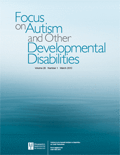
Focus on Autism and Other Developmental Disabilities
Exploring the complexities of developmental disabilities.Focus on Autism and Other Developmental Disabilities, published by SAGE Publications Inc, is an esteemed academic journal dedicated to advancing the understanding of autism and related developmental disorders. With a significant publication history dating back to 1986, this journal encompasses a wide range of interdisciplinary research, addressing key areas such as cognitive neuroscience, neurology, pediatrics, and mental health. The journal features a robust peer-review process, ensuring the dissemination of high-quality research critical for professionals in the field. While it is not an open access journal, Focus on Autism offers various access options for academic institutions and individuals, fostering an environment of shared knowledge and collaboration. With its recent categorization in the Q2 and Q3 quartiles across multiple fields within medicine and neuroscience, it stands out as a valuable resource for those looking to explore the complexities of developmental disabilities. Researchers, clinicians, and students alike will find this journal to be an essential platform for the latest findings, theoretical discussions, and clinical implications in the domain of autism and developmental disorders.
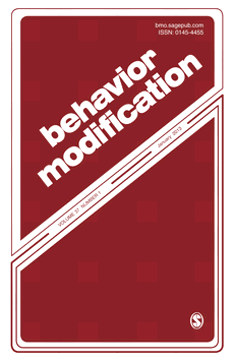
BEHAVIOR MODIFICATION
Shaping the future of behavior modification practices.BEHAVIOR MODIFICATION, published by SAGE PUBLICATIONS INC, is a prestigious journal dedicated to advancing the study and practice of behavior modification across various disciplines. With a robust ISSN of 0145-4455 and an E-ISSN of 1552-4167, this journal has established itself as a vital resource for researchers and practitioners since its inception in 1977. Recognized for its academic rigor, it is classified in the Q1 quartile for Arts and Humanities and Q2 in Clinical Psychology, as well as Developmental and Educational Psychology for 2023, showcasing its influence and relevance in these fields. The journal's Scopus rankings further exhibit its high standing, with 90th percentile in Arts and Humanities and 75th percentile in both development and clinical psychology categories. Although it is not an open-access journal, it provides essential insights and comprehensive research aimed at promoting evidence-based practices and innovative interventions in behavior modification. With a commitment to fostering interdisciplinary collaboration, BEHAVIOR MODIFICATION serves as an essential platform for researchers, professionals, and students seeking to enhance their understanding of behavioral principles to impact individual lives positively.
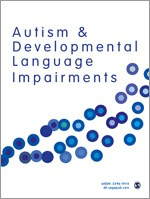
Autism & Developmental Language Impairments
Connecting academia and practice for transformative outcomes.Autism & Developmental Language Impairments is a pioneering peer-reviewed journal published by SAGE Publications Inc that focuses on advancing the understanding of autism spectrum disorders and language impairments across the developmental spectrum. Since its inception in 2016, this open access journal has provided a platform for researchers, practitioners, and educators to disseminate innovative research findings, clinical practices, and theoretical insights, reaching a global audience. The journal is notably indexed in prestigious databases and has established its credibility with a remarkable Rank of Q2 in both Clinical Psychology and Developmental and Educational Psychology as of 2023, solidifying its importance in these vital fields. Based in the United Kingdom, it addresses crucial issues in mental health, reflecting a commitment to fostering advancements that seek to enhance the lives of individuals affected by developmental language impairments. As it converges into its next phase from 2016 to 2024, Autism & Developmental Language Impairments continues to play an essential role in bridging gaps between academia and practice, making it an invaluable resource for researchers, clinicians, and students dedicated to this critical area of study.

CHILD PSYCHIATRY & HUMAN DEVELOPMENT
Shaping Futures Through Child Psychology ResearchCHILD PSYCHIATRY & HUMAN DEVELOPMENT, published by Springer, stands at the forefront of research in the fields of developmental and educational psychology, pediatrics, perinatology, and child psychiatry. With an ISSN of 0009-398X and an E-ISSN of 1573-3327, this esteemed journal has been a vital resource for academics since its inception in 1970. Currently ranked in the Q1 category across its multiple relevant disciplines, it illustrates a significant impact with its Scopus rankings, placing it within the top 13% for pediatrics and child health and the top 18% for developmental psychology. Its comprehensive scope ensures that leading-edge studies, reviews, and discourse are accessible, contributing greatly to the understanding of mental health and developmental processes in children. With no open access option, the journal maintains a commitment to high-quality, peer-reviewed content that is invaluable for researchers, healthcare professionals, and students alike, as they strive to advance their knowledge and practices in child psychology and human development.
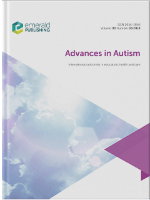
Advances in Autism
Transforming Knowledge into Action in Autism StudiesAdvances in Autism is a prominent academic journal published by Emerald Group Publishing Ltd, dedicated to the comprehensive exploration of autism spectrum disorders through the lenses of Cognitive Neuroscience, Developmental Psychology, and Psychiatry and Mental Health. Since its inception in 2015, the journal has made significant strides in disseminating high-quality research and fostering interdisciplinary collaboration within its diverse scope. With a respectable 2023 impact factor placing it in the Q3 category across multiple relevant fields, including Neurology and Clinical Psychiatry, Advances in Autism serves as an essential resource for researchers, practitioners, and students alike, aiming to advance the understanding of autism and its related challenges. Although currently not open access, the journal provides various subscription options to facilitate widespread access to its cutting-edge insights and empirical studies, making it an indispensable tool for anyone invested in autism research.

Review Journal of Autism and Developmental Disorders
Advancing knowledge in autism research.Review Journal of Autism and Developmental Disorders, published by Springer Heidelberg, stands as a leading platform for the dissemination of groundbreaking research in the realm of autism and developmental disorders. With an ISSN of 2195-7177 and an E-ISSN of 2195-7185, this journal not only showcases high-quality research but also emphasizes the crucial intersections between behavioral neuroscience, cognitive neuroscience, developmental neuroscience, and psychiatry. Notably, the journal has achieved a prestigious Q1 ranking across these categories, reflecting its impact and relevance; it ranks 10th in behavioral neuroscience and 5th in developmental neuroscience within Scopus metrics. Spanning from 2014 to 2024, the journal is dedicated to fostering a deeper understanding of autism spectrum disorders and related conditions, making it indispensable for researchers, clinicians, and students alike. While it operates under a traditional access model, the quality of the peer-reviewed articles ensures that it remains a valuable resource in the academic community.
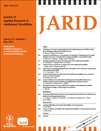
JOURNAL OF APPLIED RESEARCH IN INTELLECTUAL DISABILITIES
Innovating Solutions for Intellectual Disabilities.The Journal of Applied Research in Intellectual Disabilities, published by Wiley, is a pioneering platform dedicated to advancing knowledge and promoting best practices in the field of intellectual disabilities. With an impressive impact factor reflecting its significance—ranking in the Q2 category for Developmental and Educational Psychology and the Q1 category for Education in 2023—this journal serves as an essential resource for researchers, practitioners, and students alike. Its wide contribution to social sciences is evidenced by its high standings in Scopus rankings, positioned at Rank #297 in Education and Rank #103 in Developmental and Educational Psychology. This journal not only fosters innovative empirical and theoretical research but also encourages the dissemination of practical solutions to enhance the quality of life for individuals with intellectual disabilities. With access options available to meet diverse needs, including open access, it strives to make impactful research widely available, bridging the gap between academic research and practical application.